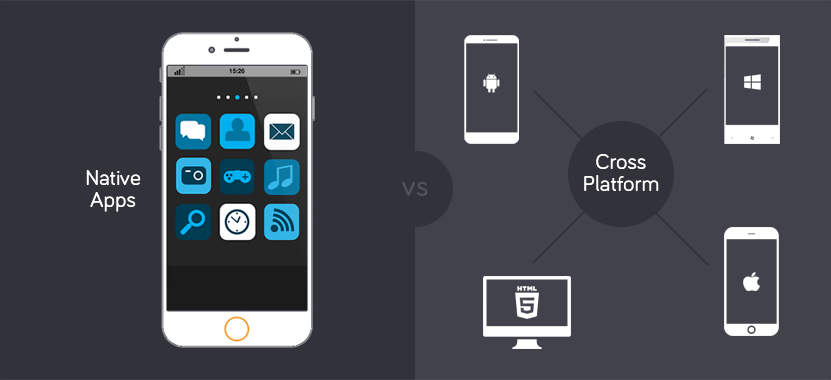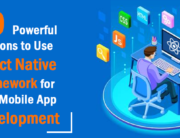Due to the evolution of mobile technology and its easy access, the mobile app market of the world has been expanding rapidly. In a time like this, it is nearly impossible to ignore such a lucrative market. As covered earlier, businesses have quite a few options for the approach they want to opt for the development process. In the previous article, we made a comparison between native and web apps to help make the right choice. However, apart from web apps, another great option that businesses have is that of a Cross Platform app.
In this we will be analyzing the pros and cons of native and cross platform apps to help you evaluate your position more precisely and make a more accurate decision.
Native Applications
Native applications are those that are developed for a specific platform (like Android or iOS) using the platform specific programming language and other standardized development tools. They can easily access all hardware features of the device such as GPS, camera etc. Native apps are usually downloaded directly from app stores (App Store, Google Play).
Cross-Platform Applications
Cross platforms apps are those that are compatible with multiple platforms after being coded only once. Cross platform apps have the flexibility to provide an interface and feel same as that of a native mobile app. Their development includes writing just one code for the core logic which is usually over 70% of the total code whereas the rest of it is the one that decides the interface for each platform.
Now that we have a brief overview of both, let us have a detailed look into the pros and cons of each.
Native Application Development Process Analyzed
Benefits of Developing a Native Mobile App

1. Performance: Native apps are developed using platform specific IDEs or Integrated Development Environments. Due to this, the app is seamlessly integrated with the platform and works in tandem with it. It gets the complete support of all of the platform’s enhancements.
2. User experience: The user experience conventions are different for each platform and often users prefer these conventional user experience interface that are specific to the platform they use the most. Designing a native app can help you make sure that the UI elements crucial for the platform users are in accordance to their comfort.
3. Hardware Compatibility: As mentioned earlier, since native apps are created in platform specific IDEs, they have access to all the features and functionalities of the device that the platform supports.
4. Better Integrations with New Features: In response to the rapidly evolving mobile technology, devices and their corresponding platforms launch new features every year. Native apps can access these new features almost immediately after their release.
5. Easier Testing: For native apps, developers and testers have a variety of technologies at their disposal to intricately test out the app. Hence, the bugs and performance issues have a better scope of being detected with these elaborate technologies at hand.
Cons of Developing a Native App

1. Speed of Development: Developing native apps takes a lot of time as they have to be written separately for each platform. This also causes an increase in time required to test these apps.
2. Development Costs: Due to development speed, development costs are automatically increased since more resources are required to be employed to develop the app. It also requires developers with expertise in the platform specific programming languages.
3. Maintenance and Support: Again, it is very time consuming to maintain an app that runs on a number of platforms as they have to be seen to individually. It also demands for more resources for the same and hence overall costs.
Cross-Platform Application Development – Analyzed
Benefits of Cross-Platform Mobile App Development

1.Development Speed: Developing cross platform apps are a much faster process since over 70% of the code has to be written only once and is shared by multiple platforms. Only a little extra coding is required for developing the user interface specific to each platform.
2. Development Cost: Since most of the code is shared, it requires much less resources at its disposal. Also, the number of developers required reduces significantly as developers with an expertise on only one framework (Xamarin) is required.
3. Maintenance and Support: Since, cross-platform development introduces a much simpler development lifecycle, the maintenance and updates required too are easier. Any bugs in a code, updates, addition of new features all need to be done just once. Therefore, maintaining cross platform apps are much simpler than native ones.
4. Fewer Bugs and Errors: Programming languages of cross platform apps are simple and type safe which helps prevent type errors that could result in flawed program behavior. Another reason for this is the fact that since most of the code is shared, the code is not exceptionally long. Lesser code also leads to a lesser bugs.
5. Greater Reach: One great advantage with cross platform apps is that they can be launched at multiple platforms at once without any delay unlike in Native apps. This also reduces efforts on marketing the app for different platforms separately.
Cons of Developing a Cross-Platform App

1.Platform Integration: When it comes to integrating the app with the local settings, preferences and notifications apps, there could be some issues dealing with multiple apps. Hence it’s important that your developers are highly skilled and experienced.
2. Access to Limited Features: Each platform provides its own features. When designing a cross-platform app, developers will have access to only the common features. However, almost all of the majorly used features are common.
3. App might Run Slower: Since the code written for all platforms is similar, calling the code might take a while since it first has to be converted into a language specific to the platform.
Native App Development Vs. Cross Platform App Development – Conclusion
As mentioned in the previous article, choosing the right type of app is always dependent on your business goals and current situation. However, choosing between the option of a cross platform app and a native app isn’t as easy as choosing from a native app and a web app. Cross platform apps definitely provide a leverage over native apps in several crucial instances, however native apps too have some leverage over them.
In recent times, a hybrid native cross-platform application development technique has come up as an effective solution for this dilemma. However, it still is always better to consult an experienced mobile app development agency before making a decision.







Leave A Comment